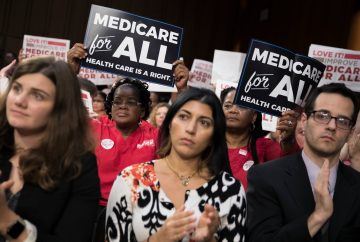by Carol A Westbrook

“Medicare for All” is a battle cry for the upcoming national elections, as voters’ health care costs continue to skyrocket. Universal Medicare, they believe, will provide free health care, improve access to the best doctors, and lower the cost of prescription drugs. Is it a dream, or is it a nightmare?
I am 100% in favor of universal health care, but believe me, it ain’t gonna be free. True, I’m not an economist–I’m a doctor–but I can do the math. I’ve had years of experience, both practicing under Medicare’s system and as a Medicare patient, and I understand something about health care costs. Few voters under age 65 understand what Medicare provides, and even fewer have a grasp on what it will cost the government–and ultimately the taxpayer–to extend it to all.
What Medicare provides for free is Medicare A insurance, which covers inpatient hospital, costs. To cover outpatient and emergency room visits, the senior must purchase Part B, which covers 80% of these charges. Medicare B costs $135/month plus a sliding scale based on income. Prescription drug coverage requires purchasing Medicare D from a private company. (Medicare C is alternative private insurance). Medicare A, B and D premiums are all deducted from the monthly Social Security check. Additionally, a senior may purchase a Medicare Supplement from a private insurance company, which covers the un-reimbursed Part A, and B costs. Confusing? Here are two examples. Read more »
